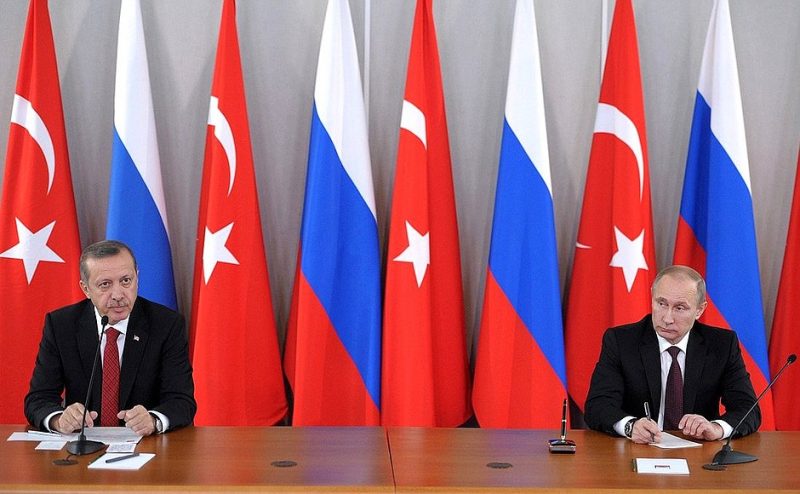 Russian Kremlin website
Russian Kremlin website
Geopolitical Considerations for Russia’s Turkish Stream Pipeline
European powers are bristling at the latest example of ongoing NATO-Russia tensions as NATO and Russia both run large-scale military drills in Northern Europe this summer and into Fall 2017. Yet Russia’s war games are paralleled by increased diplomatic activity to spread Russia’s sphere of influence and secure Russia’s leading position in the European energy market. Beyond Russian plans to establish a permanent military presence in the Mediterranean Sea and conduct military drills with nearly 100,000 troops near NATO borders, Russian energy dominance over Europe provides another facet for the growing sphere of Russian influence.
Warm relations between Turkey and Russia, though threatened briefly after Turkish aircraft shot down a Russian jet in 2015, ushered in a working partnership on the Syrian conflict and regional issues, including energy. Russia is prioritizing the construction of the Black Sea Turkish Stream pipeline that will run oil from Southern Russia through the Black Sea – just south of the Crimea peninsula – and into Turkey. The first of the two parallel pipelines is expected to open March 2018.
Last year, Gazprom, Russia’s largest state-run energy giant, supplied almost a third of European gas. This year, Gazprom anticipates continued increases in demand and expects Europe to rely on Russia for record level imports of natural gas. In order to meet rising gas demands and increase the Russian market share, the Turkish Stream pipeline construction has been accelerated and is not likely to be stopped by the Trump administration’s new sanctions. The Turkish Stream pipeline involves strategic regional partners, while specifically avoiding Ukraine, to reinforce economic influence and military footholds in the Black and Mediterranean Seas.
President Trump urged states attending the Three Seas Initiative in Warsaw to use U.S. gas rather than Russian gas, yet his call came after a deal between Hungary and Gazprom to extend the pipeline to Hungary through Bulgaria and Serbia. Though this requires increased dependency on Russia, Hungarian Foreign Minister Peter Sijarto stated, “Connections to the new pipeline are a matter of national and energy security and economic development.” President of the Serbian Gas Association, Vojislav Vuletic echoed these ideas when he claimed “Serbia would reap ‘extraordinary benefits’” from the plan to run the Turkish Stream pipeline through Serbia where, Vuletic added, there is “no alternative to Russian gas.”
A consideration for the Turkish Stream Pipeline is that it bypasses Ukraine to diminish Ukrainian strategic importance as a major country of transit of Russian oil to European energy markets. Russia’s use of pipelines around Ukraine potentially denies Naftogaz, Ukraine’s national oil and gas company, and the country “hundreds of millions of dollars in transit fees.” Russia is now looking to forge relationships with countries in Southeastern Europe reliant on Ukraine’s distribution of Russian natural gas, including NATO-member Greece. After President Putin signed the economic deal that could push the pipeline forward, Alexis Tsipras, Prime Minister of Greece, stressed that “strengthening [Greek] connections with Russia is our strategic choice,” to further assist Greece’s economic recovery with new focus on trade, energy, and migration.
Russian presence in the Black and Mediterranean seas increases the sphere of Russian military and economic influence to contest NATO and American power. Russian activity to cultivate ties to regional powers could be seen as part of a larger plan to “disrupt NATO at large.” Specifically, deepening ties between Greece and Moscow raises concerns over Russian influence on a NATO ally and, according to NATO officials, “undermine attempts by NATO to present a united front against Russia.”
Russia’s actions continue to show “signs of an underlying campaign to creep into NATO’s southern flank” in a multifaceted approach. Militarily, Russia’s upcoming war games, called “Zapad” or “West,” are stated to prepare for a full-scale conflict with NATO and “the West,” and they are the first set of drills since the annexation of Crimea. However, diplomatic measures are also at play. New moves to increase Russian control of the natural gas market with the Turkish Stream pipeline, among other projects, are another strategic aspect that increases the sphere of Russian military and economic influence to contest NATO and American power around the Black and Mediterranean Seas. Between a permanent naval presence in the Mediterranean, military drills in Northern Europe, and new foreign diplomatic activity, Moscow is exploring and protecting regional opportunities where Russian interests are at stake.





